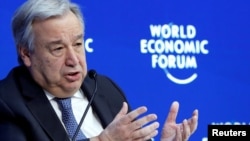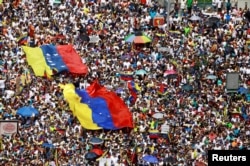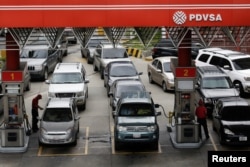U.N. Secretary-General Antonio Guterres says he hopes no foreign forces will enter Venezuela, saying the days of foreign intervention in Latin America are "long ago gone."
"I was very encouraged by the demonstration last Saturday in which the demonstrations took place without violence," Guterres told VOA at the United Nations in New York on Tuesday. "Our strong appeal is to avoid all forms of violence that, of course, serve no purpose and benefit nobody."
President Donald Trump has said U.S. military force is an "option" for Venezuela, but has not specified under what circumstances he would send in troops.
Guterres says he has offered the "good offices" to both parties in Venezuela, saying he does not believe new elections would go well.
But he said it is up to the Venezuelans to negotiate a solution.
"I think it's important that the U.N. reaffirms the availability of its good offices to support any negotiations between the two parties for a solution to be found. The Venezuelan people need it and deserve it," Guterres told VOA.
Pope Francis also said Tuesday the Vatican is willing to help negotiate a deal if both parties in Venezuela ask for it.
President Nicolas Maduro has said he sent Francis a letter seeking "help in the process of facilitating and reinforcing dialogue."
Previous rounds of talks led by the Vatican failed to prevent the current political crisis.
Humanitarian aid
Meanwhile, the opposition-led National Assembly says the military would be crossing a "red line" if it blocks deliveries of humanitarian aid to Venezuela.
Stockpiles of food, medicine and other supplies are sitting in Brazil, Colombia and on an unidentified Caribbean island, waiting to be delivered.
Maduro regards aid deliveries as the vanguard of a U.S. military invasion and is refusing to allow them.
His rival for leadership, National Assembly head and self-proclaimed interim President Juan Guaido, suspects the military is planning to divert the aid to hand out to Maduro supporters.
The powerful military is the key to which way Venezuela goes and both Maduro and Guaido are striving to win its support.
The collapse in world energy prices, corruption and failed socialist policies have wrecked the Venezuelan economy. Food, fuel and many basic goods are in severely short supply and inflation is out of control.
Millions of Venezuelans have fled the country and millions more can be expected to go.
Opposition protests
Maduro has shown little tolerance for anti-government protests and blames the United States for backing the opposition and plotting a coup.
Maduro was inaugurated for a second term last month after winning an election the United States and the opposition called a sham.
As head of the National Assembly, Guaido invoked what he says is his constitutional right to declare himself president until new elections are held.
United Nations correspondent Margaret Besheer contributed to this report.







